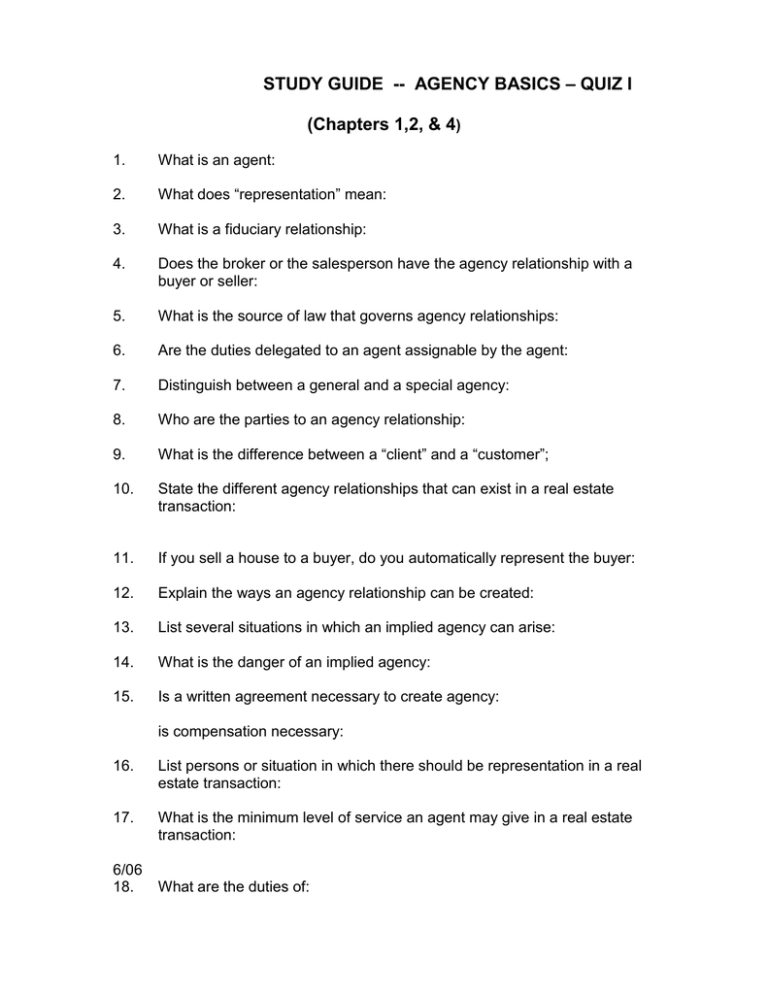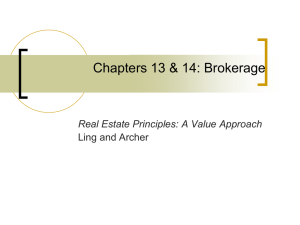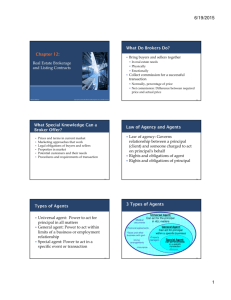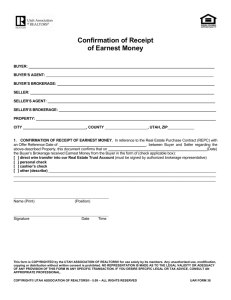STUDY GUIDE -- AGENCY BASICS – QUIZ I
advertisement

STUDY GUIDE -- AGENCY BASICS – QUIZ I (Chapters 1,2, & 4) 1. What is an agent: 2. What does “representation” mean: 3. What is a fiduciary relationship: 4. Does the broker or the salesperson have the agency relationship with a buyer or seller: 5. What is the source of law that governs agency relationships: 6. Are the duties delegated to an agent assignable by the agent: 7. Distinguish between a general and a special agency: 8. Who are the parties to an agency relationship: 9. What is the difference between a “client” and a “customer”; 10. State the different agency relationships that can exist in a real estate transaction: 11. If you sell a house to a buyer, do you automatically represent the buyer: 12. Explain the ways an agency relationship can be created: 13. List several situations in which an implied agency can arise: 14. What is the danger of an implied agency: 15. Is a written agreement necessary to create agency: is compensation necessary: 16. List persons or situation in which there should be representation in a real estate transaction: 17. What is the minimum level of service an agent may give in a real estate transaction: 6/06 18. What are the duties of: The agent to the principal: The subagent to the principal: The principal to the agent: The agent to third parties; 19. How can an agency relationship be terminated: 20. What is the difference between “renunciation” and “revocation”: 21. In a Texas transaction can a licensee be a non-agent: 22. What is an attorney in fact: 23. Describe and are they practiced in Texas: Single agent: Subagent: Common Law Dual agent: 24. Discuss undisclosed dual agency, is it ever legal: 25 When is a broker responsible for the misrepresentations of a sub-agent: 26. What are the agency educational requirements for licensure: 27. What type of agency is created by a listing agreement: 28. What is the Texas Administrative Code (TAC): 29. When do an agent’s fiduciary duties terminate: 30. What are the two essential elements of an agency relationship: 31. Does the Broker represent the party that pays the commission: 32. What does TRELA require regarding the termination of a listing or buyer representation agreement.: 33. Define ostensible agency and agency by estoppel: STUDY GUIDE – INTERMEDIARY PRACTICE – QUIZ 2 (Chapters 8, 9, and Appendix B) 1. What is the source if the Intermediary relationship law: 2. What is the danger in the “in house” transaction: 3. What law has been passed to deal with the problems raised by the “in house” transaction: 4. Who is the “intermediary” – the broker, the salesperson, or both: 5. Must a buyer be represented in order to buy a house: 6. What is the danger if a buyer is not represented: 7. Is there any way that a broker can represent both the buyer and the seller in an “in house” transaction: 8. What is an in-house transaction: 9. Discuss single agency and the duties for: Seller’s agent: Seller’s subagent: Buyer’s agent: 10. If you are showing / selling property from another firm, what type of agency could be practiced: What type of agency should be practiced: 11. When should common law dual agency be practiced: 12. Does Texas have a statutory dual agency, is common law dual agency the same thing, is common law dual agency legal in Texas: 13. In what ways may an “in house” transaction be handled, what is the preferable way and why: 14. What are the two types of Intermediary practice: 15. What is the main importance to the consumer of having a licensee appointed by the Intermediary broker: 16. What are the duties and level of service in each type of Intermediary relationship: 17. Does the listing agreement, or the buyer representation agreement create the Intermediary relationship, or is more required, If so what: 18. How is the Intermediary relationship created: 19. What information must be contained the the intermediary consent: 20. Who can make appointments, and how are they made: 21. Must a broker make appointments, or is it optional with the broker to do so: 22. If a broker only has one salesperson, may the broker act as an intermediary and may the broker make appointments: 23. To what type of transactions does agency / intermediary law apply: 24. What precautions should be taken when a salesperson purchases an in-house listing for herself: 25: A licensee selling or buying property for himself must disclose: STUDY GUIDE - AGENCY DISCLOSURE AND INFORMATION – QUIZ 3 (Chapters 10, 11, and Appendix B) 1. What is the “written information” referred to in TRELA: 2. What is the “Information About Brokerage Services”: 3. What information has to appear in the “Information About Brokerage Services”: 4. Must the TREC form for the “Information About Brokerage Services” be used: 5. To whom should the written information about brokerage services be presented: 6. What are the exceptions to presenting the written information: 7. When should the written information be presented: 8. In what format must the written information be presented; 9. What is a “substantive dialogue”: 10. Must the information about brokerage services be presented in writing only, or can it be presented orally: 11. Must the written information or the “Information about Brokerage Services” be signed, if so, by whom: 12. Can the “Information About Brokerage Services” be used to authorize an Intermediary , or any other agency relationship. 13. To whom are you required to disclose who you represent: 14. Is disclosure of representation the same as presenting the written information about brokerage services; 15. Are there any exceptions to the disclosure of representation: 16. When should you disclose your representation: 17. Should the disclosure of representation be done orally or in writing: 18. What is the penalty for failing to disclose your representation: 19. What is the penalty for failing to present the written information: 20. What is the difference between an independent contractor and an employee. Who determines the status: 21. Who may broker’s split a fee with – when can a broker pay a referral fee; 22. Are salespersons general or special agents of the sponsoring broker: 23. Who is a “foreign broker” : 24. What are the rules for an associate to advertise his listings; 25. May a salesperson receive a referral fee; 26. Does the status of employee or independent contractor affect the agency status: 27. May a salesperson be paid a commission directly by a buyer or seller: STUDY GUIDE – LISTINGS AND BUYER REPRESENTATION – QUIZ 4 (Chapters 5,6, & 7) 1. Is the agency relationship between the broker and seller or buyer a general or special agency 2. Who determines the amount of commission to be paid by the seller: 3. Who are the principals to the listing and to the buyer rep agreement: 4 Distinguish between an open listing, an exclusive agency and an exclusive right to sell listing: 5. Is a listing or buyer rep agreement assignable: 6. What effect does the death of the sales associate have on the listing: 7. What effect does the death of the broker have on the buyer rep agreement: 8. What is a “net” listing, is it legal, when should it be used: 9. What is the MLS, discuss its purposes and restrictions: 10. How may listings and buyer rep agreements be terminated: 11. How is a buyer’s broker paid: 12. What are the requirements to collect a commission in Texas: 13. Which offers must be submitted to the seller: 14. Who decides the listing price for a house – what is the role of a CMA: 15. Who does the sub-agent owe fiduciary duties to: 16. Who owns the listings and the buyer rep agreements: 17. May an agent take his listings or buyer rep agreements when moving to another firm: 18. What is exclusive seller or buyer agency: 19. What is the seller’s and the broker’s liability for misrepresentations of the agent and sub-agents: STUDY GUIDE - DTPA, FRAUD, DISCLOSURE – QUIZ 5 (Chapters 3, 12, & 13) 1. Distinguish between fraud and misrepresentation: 2. Distinguish between a latent and a patent defect: 3. Name five laws that are intended to protect the consumer, and state what each one covers: 4. What activities and property does the DTPA act apply to: 5. Which services rendered by a salesperson/broker are exempt from DTPA: 6. Does DTPA always cover a personal residence: 7. Under what circumstances is a licensee exempt from the DTPA 8. What activities does the DTPA prohibit: 9. What is the notice provision in the DTPA, what is it for: 10. Does the DTPA require mediation: 11. What penalties can a court impose for a DTPA violation: 12. Distinguish between “knowingly” and “intentionally” and what are the consequences of each: 13. What are some defenses to DTPA: 14. What are some practical ways to protect yourself from a DTPA action; 15. What does TRELA require the licensee to disclose: 16. Can a court take the agent’s license: 17. Can TREC assess damages for the consumer in a DTPA case: 18. What items is a seller or agent not under a duty to disclose: 19. Should the presence of AIDS be disclosed: 20 Who must complete the Disclosure Notice 21. When must the Disclosure Notice be used: 22. What are the exceptions to the use of the Notice 23. When does the Notice have to be delivered 24. What are the consequences of late or non-delivery of the Notice 25. Who signs the Notice and what do the signatures indicate: 26. What should the seller do if the information required by the Notice is not known: 27. Can the Notice be altered or added to: 28. What is an “as is” sale and what are the requirements: 29 What is Megan’s law: 30. Must a death on the property be disclosed:







